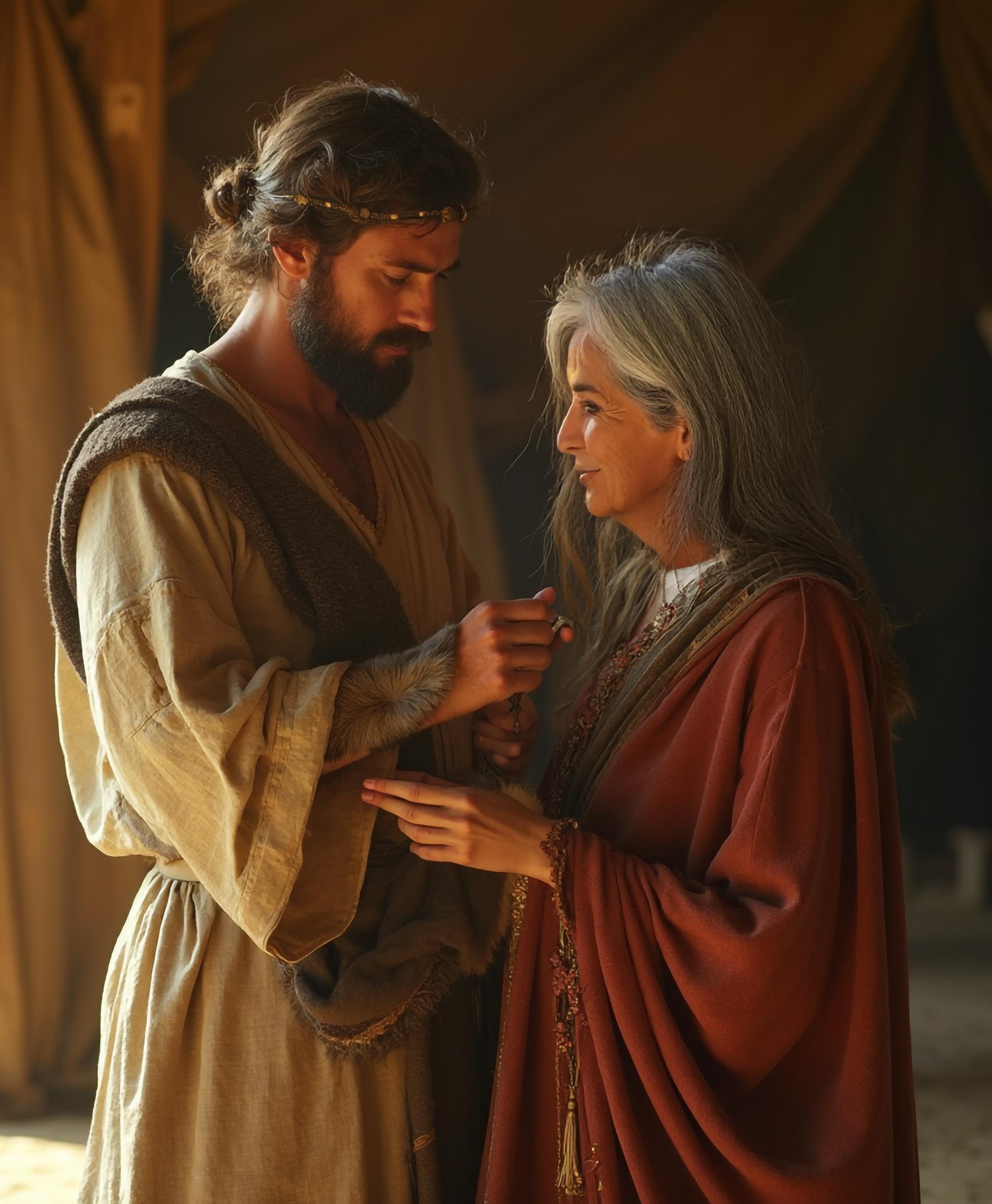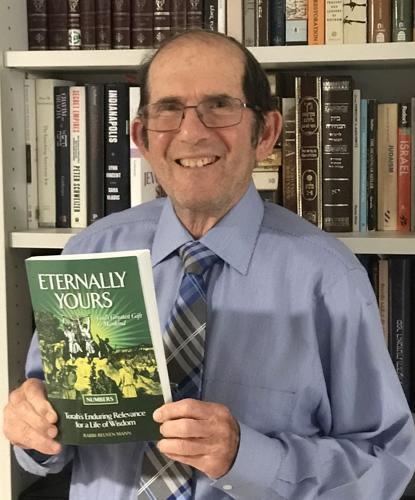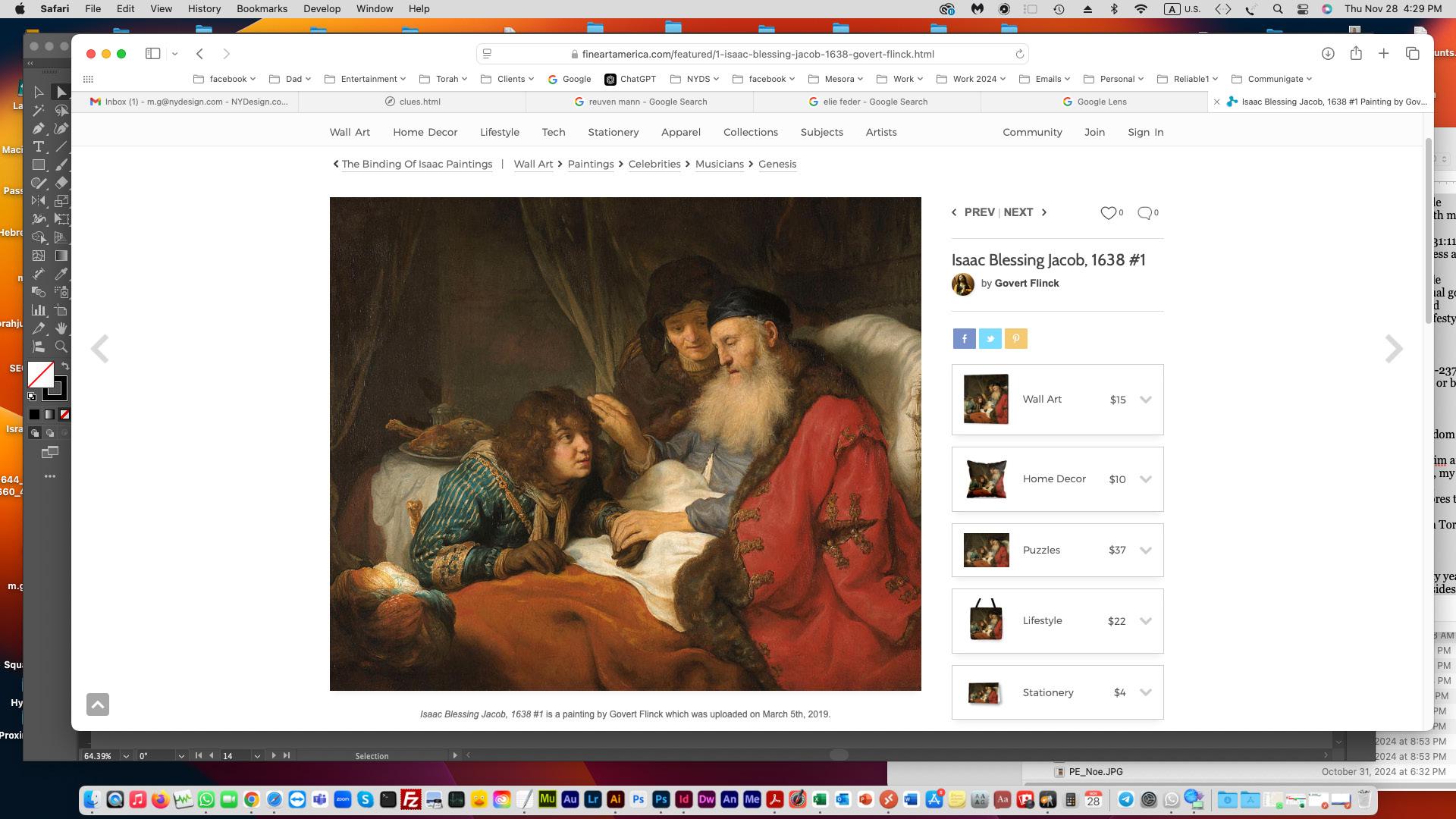












“ is is a book that will be an eye-opener for many as well as a source of inspiration, courage and hope. We owe Rabbi Feder a debt of gratitude for making these teachings available May they be a catalyst to bring Jews back to Hashem.”
Rabbi Breitowitz, Ohr Sameach
“ is book is a must read for anyone who is struggling to make sense of what Hashem may be communicating to us in the absence of prophecy, and more impor tantly, how we are meant to respond.”
Rabbi Weil, FIDF
“Rabbi Feder’s passion to help Am Yisrael through relevant and incisive Torah questions and then provid ing truthful, clarifying, and hard hi ing answers are a true anti dote to the travails of our nation in this modern era.”
Rabbi Zweig, Talmudic University




RABBI

Why inquire from a prophet, but not her own husband? Of what signi cance is Esav’s hairy nature?
Why are we told that Jacob seized Esav’s heel at birth?
Of what signi cance is it that “Rivkah loved Jacob, while Isaac loved Esav?” Why did Rivkah deceive Isaac? Why were blessings needed?

RABBI MOSHE BEN-CHAIM
RABBI: Why was Eisav born so hairy? Why must Torah teach us this? Why was Jacob grabbing on Eisav's heel when he was born? What's the significance of this? Why didn't Rivka tell Yitzchak to bless Jacob, but she fooled him instead?
DANI ROTH: Why was the blessing so important anyway?



RABBI: Talmud (Sanhedrin 91a) begins to addresses your question:
The descendants of Ishmael and the descendants of Keturah came to judgment with the Jewish people before Alexander of Macedon. They said to the Jewish people before Alexander: “The land of Canaan is both ours and yours, as it is written, ‘And these are the generations of Ishmael, son of Abraham, whom Hagar the Egyptian, Sarah’s maidservant, bore unto Abraham’ (Genesis 25:12), and it is written, ‘And these are the generations of Isaac, son of Abraham’ (Genesis 25:19). Therefore, the land should be divided between Abraham’s heirs.”
Geviha ben Pesisa said to the Sages, “Give me permission and I will go and deliberate with them before Alexander of Macedon. If they will defeat me, say to them, ‘You have defeated an ordinary person from among us, and until you overcome our Sages, it is no victory.’ And if I will defeat them, say to them, ‘The Torah of Moses, our teacher, defeated you, and attribute no significance to me.’” The Sages gave him permission, and he went and deliberated with them.
Geviha ben Pesisa said to the descendants of Ishmael: “From where are you citing proof that the land of Canaan belongs to both you and the Jewish people?” They said to him, “From the Torah.” Geviha ben Pesisa said to them, “I too will cite proof to you only from the Torah, as it is stated, ‘And Abraham gave all that he had to Isaac. But to the sons of the concubines that Abraham had, Abraham gave gifts, and he sent them away from his son, while he yet lived, eastward, to the east country’ (Genesis 25:5,6).
[From this we say] in the case of a father who gave a document of bequeathal to his sons during his lifetime and sent one of the sons away from the other, does the one who was sent away have any claim against the other? The father himself divided his property!’” Therefore, Israel (Canaan) belongs solely to Isaac and not Ishmael.
Dani, we see from this Talmudic portion that others will seek to claim Israel (happening today with the Palestinians), a land truly the inheritance from God, and the possession of Isaac alone, transferred to his son Jacob and to the Jewish nation.
God knew this is how history will unfold, so He told Abraham that Isaac alone is his seed (Gen. 21:12), and that His treaty and gift of Israel is only with Isaac (Gen. 17:21). Abraham foresaw future contention over Israel, and therefore Abraham gave Isaac everything (Gen. 24:36), and no land to his other children from the concubines. Isaac too selected Jacob alone to receive God’s treaty, and knowingly gave that blessing to Jacob (Gen. 25:4). In addition to the land of Israel, and to further benefit Jacob and the future Jewish nation, God gave a prophecy to Rebecca (Gen. 25:23) to ensure Jacob receives Isaac’s blessings of the “superior son,” that Jacob be appointed as master over Eisav, which Isaac confirmed even after the ruse was exposed (Gen. 2:33). Thus, for the purpose of Jacob rightfully “stealing” the blessings which Eisav already sold to him, the deception was necessary.
The blessings were needed for the world to accept whom God chose, also endorsed by the patriarchs: the authoritative determinators of bequeathal and inheritance. Others will attempt to claim ownership of Israel and Bible authority, seen in Arabs in Gaza claiming Israel is theirs, and Christian claims of a “new covenant.” But God foresaw all this and implanted safeguards in Torah in the form of 1) His will, and 2) the will of the patriarchs. Therefore, Abraham's sending away of the concubines’ children indicates that only Isaac was his true heir to Israel. And Isaac’s blessings reiterate that Jacob is the sole heir of Israel, and of leadership. Thank you Dani for your question. ■





What is the most consequential feature of successful marriages? Most therapists and marriage counselors would likely point to the ability to communicate e ectively. This skill is vital not only for marriages but for all human relationships. The success of any partnership hinges on the participants’ ability to exchange ideas, resolve disagreements, and collaborate through meaningful dialogue.
This trait is exemplified in the marriage of our first patriarch, Avraham, and our matriarch, Sarah. Their relationship was characterized by open communication and shared decision-making. For instance, when Avraham feared that the men in Egypt or Gerar would kill him to take Sarah, he shared his concerns with her. Together, they agreed to pose as siblings to protect themselves.
Sarah also took the initiative to suggest that Avraham marry her maidservant, Hagar, so they could produce an heir. Even during conflicts, such as when Hagar acted disrespectfully toward Sarah, she voiced her grievance to Avraham. He responded by advising her to address the matter as she deemed appropriate.
The most significant disagreement between Avraham and Sarah concerned Yishmael. Observing Yishmael’s mocking behavior toward Yitzchak, Sarah insisted that Avraham send away Hagar and her son to protect Yitzchak’s rightful position as heir: “Drive out this slave woman with her son; for the son of that slave woman shall not inherit with my son, with Yitzchak!” (Bereishit 21:10).
Avraham was deeply pained by this request and reluctant to act. However, Hashem intervened, instructing him, “Whatever Sarah tells you, heed her voice, since through Yitzchak will o spring be considered yours” (Bereishit 21:12). Rashi explains that Hashem a rmed Sarah’s greater insight into this matter. Avraham ultimately followed her directive and, without delay, sent Hagar and Yishmael on their way.
Avraham and Sarah’s marriage serves as a model of collaboration and mutual respect, where open communication and shared decision-making enabled them to navigate challenges and maintain unity.
In contrast, the marriage of Rivka and Yitzchak followed a di erent pattern. From the outset, their separateness is apparent. While both prayed for a child, Rashi comments on Bereishit 25:21 that they prayed individually: “He prayed in one corner, and she prayed in the other corner.” Notably, Hashem’s
response to Yitzchak’s prayer underscores the distinctiveness of their petitions rather than a unified e ort.
When Rivka experienced an unusually turbulent pregnancy, she exclaimed, “If so, why am I thus?” (Bereishit 25:22). Rather than consult her husband, a known prophet, she sought guidance from Shem and Ever, who were renowned for their prophetic insight. Moreover, she did not share the divine message she received with Yitzchak, a striking contrast to the open dialogue seen in Avraham and Sarah’s relationship.
The lack of communication culminates during Yitzchak’s decision to bless his sons. Rivka, realizing that Yitzchak intended to bless Eisav, regarded this as a grave error with potentially disastrous consequences for the Abrahamic legacy. She “overheard” Yitzchak instructing Eisav, “Hunt game for me. Then prepare delicacies for me such that I love and bring it to me and I will eat; so that my soul may bless you before I die.” (Bereishit 27:3-4).
Viewing this decision as a fatal mistake, Rivka did not confront Yitzchak directly. Instead, she devised a plan to thwart his intentions by enlisting Yaakov to impersonate Eisav and receive the blessings. When Yaakov expressed concern that his father might recognize the deception and curse him, Rivka reassured him with unwavering confidence: “Your curse shall be upon me, my son; only go fetch them for me” (Bereishit 27:13).
After being deprived of Yitzchak’s blessing, Eisav became furious and resolved to kill Yaakov after their father’s passing. Although Eisav kept his plans secret, Rivka somehow discovered them. Yet, she again refrained from informing Yitzchak. Instead, she warned Yaakov of the danger and instructed him to seek refuge with her brother Lavan until Eisav’s anger subsided, and it was safe to return to Canaan.
Yaakov could not leave home without his father’s explicit approval. To ensure Yaakov’s departure, Rivka skillfully maneuvered her unsuspecting husband and framed his journey as a search for a suitable wife. She appealed to Yitzchak, referencing Eisav’s unsavory marriages: “I am disgusted with my life because of the daughters of Cheit. If Yaakov marries a woman like these, from the daughters of the land, what good will my life be to me?” (Bereishit 27:46). Yitzchak, unaware of her true motive and Eisav’s murderous intent, arrived at the same conclusion as Rivka and urged Yaakov to travel to Lavan, her brother, to find a wife.
This pattern of minimal communication between Yitzchak and Rivka raises questions. Why did Rivka feel the need to act unilaterally, even going so far as to thwart her husband’s plans? Did such behavior reflect egotism or arrogance? This is certainly not the case. The answer, rather, lies in the unique dynamics of their relationship.
The marriage of Yitzchak and Rivka demonstrates that there is no single blueprint for a successful marital union. Unlike Avraham and Sarah, whose personalities lent themselves to joint communication and problem-solving, Yitzchak and Rivka operated within separate and complementary roles.
Yitzchak is described by the Rabbis as an Olah Temima (an unblemished burnt o ering). This sacrifice is completely incinerated on the Altar, with no part of it consumed by the Kohanim. Similarly, Yitzchak devoted himself entirely to Hashem, directing all his energies toward spiritual service and abstract thought, leaving mundane matters to others.
Rivka, by contrast, was highly attuned to the practical realities of the world. From a young age, she demonstrated independence and boldness. When her family hesitated to let her leave immediately, they asked if she was ready to “go with this man.” She confidently replied, Eileich (“I will go!”) (Bereishit 24:58).
Already, Rivka manifested the insight to recognize Eliezer’s genuine trustworthiness and the courage to leave the security of her family to embark on a new life in a foreign land. Her practical wisdom and boldness were vital in navigating the challenges that arose in their family life.
Rivka had the utmost respect for her husband and recognized his spiritual greatness in the realm of abstract religious ideas. However, she also understood that his strengths did not extend to matters of practical judgment, particularly concerning their children.
Hashem entrusted Rivka alone with the prophecy regarding her sons: “Two nations are in your womb… the elder shall serve the younger” (Bereishit 25:23). This divine message a rmed her responsibility to guide the family’s future, just as her mother-in-law, Sarah, had done. Rivka’s actions, though unconventional, were rooted in a profound understanding of what was necessary to preserve the Abrahamic legacy.
Thus, she refrained from confronting Yitzchak about his attitude toward their sons or informing him that his plan to include Eisav in the blessings was misguided. She knew that such an approach would be fruitless and could jeopardize their mission. Instead, Rivka devised a plan with Yaakov to ensure that Yitzchak’s blessings would be conferred upon the younger but truly deserving son.

However, a stumbling block emerged. Yaakov expressed valid concerns about the deception, saying, “Perhaps my father will feel me, and I shall be as a mocker in his eyes; I will thus bring upon myself a curse rather than a blessing” (Bereishit 27:12). While Yaakov understood the importance of securing the Brachot (blessings) from Eisav, he was unwilling to risk a curse from his father. Rivka, recognizing the legitimacy of her son’s fear, reassured him with great boldness and supreme confidence in her wisdom: “Your curse shall be on me, my son; only go fetch them for me” (Bereishit 27:13).
Convinced by her resolve, Yaakov followed her plan, successfully securing the blessings and ensuring that Eisav would not assume a prominent role in the future of Am Yisrael (the Nation of Israel).
Rivka’s independence and courage were instrumental in the development of Klal Yisrael (the Nation of Israel). She was masterful in managing her relationship with Yitzchak and in raising their children. Their marriage was smooth and harmonious because both were fully dedicated to the same ideals. Yitzchak, who never left Eretz Yisrael (the Land of Israel), focused on elevating the religious movement of Avraham to unprecedented spiritual heights. Rivka ensured the transmission of Torah to the next generation by orchestrating that all of Yitzchak’s blessings would be conferred upon their truly qualified son, Yaakov.
The relationships of Avraham and Sarah and Yitzchak and Rivka illustrate the diversity of successful marriages. Avraham and Sarah thrived on open communication, while Yitzchak and Rivka relied on their distinct roles and complementary strengths. Both models were rooted in respect, shared values, and a commitment to spiritual ideals.
Rivka exemplified the Eishet Chayil (Woman of Valor), as described in Mishlei 31:11: “Her husband’s heart has trust in her, and he shall lack no fortune.” Her decisiveness and courage were instrumental in safeguarding the future of Klal Yisrael.
From these stories, we learn that successful marriages do not conform to a single standard. Rather, they are built on mutual respect and dedication to shared spiritual goals.
May we merit to emulate these great Women of Valor and build harmonious and meaningful unions which enable us to faithfully transmit the Derech HaChaim (Lifestyle) of Torah in this contemporary day and age.
Shabbat Shalom. ■
From these stories, we learn that successful marriages do not conform to a single standard. Rather, they are built on mutual respect and dedication to shared spiritual goals.

Rabbi Reuven Mann has been a pulpit Rabbi and a teacher of Torah for over fifty years. He is currently the Dean of Masoret Institute of Judaic Studies for Women and resides in Arnona, Jerusalem. Questions/Comments: Please reach out to Rabbi Mann on WhatsApp 050-709-2372 or by email at: rebmann21@aol.com or to Mitch Rosner on WhatsApp 054-426-3419 or by email at: mitchrosner@gmail.com Additionally, I have a new series of YouTube videos called “Rabbi Reuven Mann Torah Thoughts”: https://bit.ly/49N8hyX






Reading the Parsha each week, at times we gloss over “simple” information, assuming nothing more is intended below the surface. But this cannot be the case. Maimonides teaches, “There is a good reason for every passage; the object of which we cannot see. We must always apply the words of our Sages: ‘It is not a vain thing for you’ (Deut. xxxii. 47), and if it seems vain, it seems your fault’.” (Guide, book III, chap. L) With this in mind, let’s recap the story of Toldos and then isolate the questions.
Rivkah experienced a troubling pregnancy: the children were moving violently within her. Ibn Ezra says that Rivkah first asked other women if her pregnancy was the norm. When the women told her that her pregnancy was abnormal, she sought counsel from God via a prophet (either Abraham or Shem, Noah’s son). Rivkah was aware of God’s providence; initiated with Abraham and sustained unto Isaac and herself. The nation of the Jews was to be established through her. This pregnancy was unnatural and must be due to God’s will.
The prophet informed her that she will give birth to twins (two nations) and that the “greater son will be subservient to the younger.” This was the primary message. When she finally gave birth, Esav exited first, and the Torah describes him as red and covered with hair. Jacob then exited; his hand was seizing Esav’s heel. The Torah then says that Esav became a hunter while Jacob was a dwelled in tents. Isaac loved Esav, for he captured food for Isaac, while Rivkah loved Jacob. The Torah

We then learn of the sale of the
birthright. Jacob’s alacrity in requesting the birthright in exchange for the lentils appears premeditated. Later, Rivkah “somehow” hears Isaac preparing to give the blessings to Esav. Rivkah dresses Jacob in goat skins and in Esav’s garments scented from the field to deceive the senses of the now blind Isaac into thinking Jacob is the hairy hunter Esav. The ruse works. And not a split second after Jacob leaves Isaac’s presence, Esav enters requesting the blessings. This greatly frightens Isaac, as he realized through a successful blessing of Jacob that he must have been wrong about Esav. The blessings’ success indicated divine providence favoring Jacob, while all along Isaac favored Esav. Now our questions:
• What was God’s intent that Rivkah experience an unnatural, tormenting pregnancy?
• Why was Rivkah’s response to inquire about God’s providence from a prophet?
• And why did she inquire from the prophets Abraham or Shem, but not of her own husband Isaac?
• Of what significance is Esav’s hairy nature?
• Why are we told that Jacob seized Esav’s heel at birth?
• Of what significance is it that “Rivkah loved Jacob, while Isaac loved Esav?”
• How was Jacob “instantly” prepared to purchase the birthright from Esav when he asked for the lentils?
• Why are we told that Rivkah heard that Isaac was about to bless Esav?
• Why did Rivkah and Jacob agree they must deceive Isaac to obtain the blessings; why not ask Isaac openly?
• Why was Isaac shocked when Esav came before him to receive the blessings?
It is clear: God intended Rivkah to obtain information vital to the establishment of the Jewish people. Her di cult pregnancy was intended to direct her to one who would inform her of God’s intentions. With

that new information obtained via the prophet—“the older would serve the younger”—Rivkah now cherished Jacob over Esav, as she learned through that prophecy that a matter of “nations” depends on the younger Jacob. (She was told that two nations would issue from her.) The prophecy taught her to be instrumental in securing the younger son’s success, as a means of establishing the nation of Israel. She also deduced that for good reason, God bypassed Isaac, withholding from him this prophetic information.
The patriarchs and matriarchs did not function in accord with simplistic favoritism. We must not erroneously project such motivation onto them. Thus, when the Torah teaches that, “Isaac loved Esav while Rivkah loved Jacob” it teaches an important lesson. It appears this lesson is that Isaac was not as well informed as was Rivkah about the natures of their two sons. Thus, the Torah saw fit to teach us the imbalance of their divergent loves, so we might appreciate how God orchestrated His providence. As Isaac was misled by Esav’s “capturing his father with his mouth” (Gen. 25:28), Isaac desired to bless Esav and not bestow these blessings upon Jacob. Isaac was deluded by Esav’s ostensible good nature, as Esav disguised himself as upright with inquiries of proper conduct (capturing him) only to earn Isaac’s favor. In truth, Esav was evil. In contrast, the Torah teaches that Jacob was a “dweller of tents” (ibid 25:27): he was complete in his perfection and delved into the study of God.
Jacob’s proper lifestyle did not present the facade o ered by Esav’s veneer. Esav presented himself in the manner he knew his father would cherish. He “captured his father with his mouth.” Thus, the Torah thereby informs us of the need for God’s providence to work through Rivkah; she had clarity. From the very outset of the lives of Esav and Jacob, Rivkah was taught that the younger Jacob was to rule his older brother and that Jacob was to receive the blessings. This was also substantiated through Jacob’s clutching of Esav’s heel. This strange phenomenon taught Rivkah that Jacob—right out of the womb—was one who could contend and usurp his twin. Rivkah relied on this

knowledge later in her plan to deceive Isaac.
It was also vital that Rivkah receive the prophet’s communication before giving birth. Now that she understood the younger was to be favored, she could interpret Jacob clutching Esav’s heel as a divine message. God was showing Rivkah the means that He implanted into human nature to ensure her success. God also created Esav with a hairy exterior, which would also play a vital role in Rivkah’s plan.
The Torah tells us how Esav arrives home exhausted. The Rabbis teach he had murdered, committed adultery and idolatry, for on that day, Abraham had died. Esav—a man seeking an Earthly, hedonistic existence alone—was frustrated that his grandfather Abraham would actually perish from this Earth. Esav’s immortality fantasy was abruptly shattered. He no longer clung to any role model displayed by Abraham: “For what good is life, if it ends?” Esav felt. He therefore went astray from Abraham’s values and committed these grave acts. Esav, exhausted and famished, requested the lentils which Jacob had cooked. Jacob “instantly” countered with his o er to purchase the birthright from Esav, in exchange for the lentils. Thus, Jacob’s purchase was premeditated. He had already planned to obtain the birthright prior to this event; now the moment was

ripe. We might explain Jacob’s readiness to obtain the birthright was due to Rivkah’s informing him of her knowledge obtained via that earlier prophecy. Rivkah most probably explained to Jacob years earlier what she learned, that the younger Jacob was to rule over the older. This is supported by Jacob’s readiness to purchase the birthright. Later, when Rivkah “happens to overhear” (divine providence) that Isaac was about to give the birthright blessings to Esav, she urges Jacob to deceive his father and to disguise himself as Esav. The point here is that Rivkah is not first informing Jacob “that” he must obtain the birthright, but rather, “how” he can accomplish this. Thus, we find proof that Jacob already knew he was to obtain the birthright blessings. This is why he purchased them from Esav at the outset, for Rivkah must have instructed him to do so. Otherwise, without a proper purchase, what right would he have to take the birthright later? And without Rivkah informing Jacob that he should have the blessings, why would Jacob even think to purchase them? It must be as we suggest, that Rivkah learned through prophecy that Jacob must obtain the blessings and told Jacob. Therefore, Jacob was prepared at all times for the right moment to purchase them. Then, he must act to obtain them, even through deceit. For a lie is not absolutely prohibited by God. As we see God told Samuel (Sam. I; 16:2) to make believe he was o ering a sacrifice, although he was truly en route to anoint David in Saul’s place. Samuel feared that Saul would learn of this and would kill Samuel for attempting to replace him with a new king. Thus, God instructed Samuel in a deception. Jacob too did not argue with Rivkah about the deceit here. He was only concerned that his father would not curse him, but he had no concern about the deceit itself as a sin to God. Jacob knew a lie is necessary at times. And Rivkah—as well as many others—lied for just reasons. Ibn Ezra teaches there is no harm in lying if it is for a proper motive (Gen. 27:13).
In summary, Rivkah required divine instruction due to the imbalance between Esav and Jacob, and between her and her husband. She would have to act to
bring about the nation of Israel. God orchestrated an abnormal pregnancy precisely to educate Rivkah on matters of this pregnancy: the issuing nations of Jacob and Esav and how they must be guided through her, as “she loved Jacob,” i.e., in this matter she grasped reality whereas Isaac did not. Compelled to inquire from a prophet, she avoided asking Isaac about the pregnancy as she understood Isaac was lacking clarity. Rivkah became equipped with the divine knowledge, vital to ensure the blessings are bestowed upon the proper recipient. There was a need for Rivkah to learn of the di erent natures of her two sons. She learned through prophecy that Jacob would be the superior. But she also learned one more essential lesson through seeing his hand clutching Esav’s heel: Jacob possessed the natural tendency to usurp Esav. It was only through this knowledge gained by seeing his hand grabbing his brother’s heel that Rivkah thereby learned that she must harness his nature to ensure the prophecy comes to be. Had she merely received knowledge that Jacob was to be superior, this knowledge alone does not compel her to act through Jacob. Rather, it was the act of Jacob grabbing his brother’s heel whereby Rivkah understood she was seeing this for a reason. She deduced that this competitive display was necessary to indicate that her two sons have various natures, through which she must play a role to ensure these natures are acted out. She must make Jacob topple Esav in “status” when the time is right.
Rivkah teaches Jacob this prophecy when he is young, and from that point forward, Jacob is ever-prepared to purchase the birthright. And at the right moment, Rivkah and Jacob strategize a plan that succeeds, but again, only through God’s providence. For we see that, “no sooner that Jacob left, did Esav return.” This is to teach that God controlled the timing to the second, ensuring Rivkah and Jacob’s success (Gen. 27:30). And finally, Isaac too attests to Jacob’s rightful receipt of the blessings, as he tells Esav, “and he is surely blessed” (ibid 27:33). For Isaac realized that since he was able to utter the blessings,
then it must have been God’s will that Jacob had received them. Isaac’s sudden fright (ibid 27:33) also explains why Rivkah did not inquire from her husband about her abnormal pregnancy, but only from Abraham or Shem. For she understood that Isaac would reject the idea of Esav’s unfit character. That is why Jacob too could not openly ask for the blessings, even though he rightfully purchased them. Until Isaac successfully uttered the blessings, he would not accept Esav as unfit. Therefore, Rivkah avoided approaching Isaac with her concerns regarding her pregnancy, and also when securing the blessings for Jacob. And Isaac again confirms to Esav that Jacob was correct in taking the blessings, as Isaac says to Esav, “your brother came with wisdom and took your blessings.” Why does Isaac say, “with wisdom”? Perhaps to teach Esav that Jacob was correct.
The obvious questions and the clues to their answers are the true “codes of the Torah.” This is God’s method of directing us to unlock the Torah’s mysteries, imbuing us with an ever-growing appreciation for His wisdom, the development of our minds and souls, and understanding the perfection of our matriarchs and patriarchs.
Could it be that God prepared Rivkah to be Lavan’s sister, so she might learn of his cunning, as a preparation of this necessary deceit of Isaac? And could it be that Rivkah’s training of Jacob to use deceit helped to prepare Jacob to deal with Lavan for those 20 years when Lavan tried again and again to deceive Jacob? If so: it ends up that Lavan’s cunning came back to haunt him. For he displayed deceit to Rivkah in their childhood home. Thereby, Rivkah learned to be cunning herself and achieved a good outcome of the blessings. Through Rivkah’s cunning, Jacob learned how to deal with Lavan. Lavan’s cunning came full circle and ended up ruining him.
It is also clear from here and other Torah stories that God works with His prophets and righteous individuals through wisdom. God merely handed Rivka
Is Judaism mystical, or is it rational, based on reason and proofs?


certain clues, without spelling out a plan. For God desires His servants to engage wisdom and devise their own plans, and not disengage their minds. God told Abraham that Sodom was exceedingly evil, yet, there existed the option that He would not destroy them. Again, God hinted to a matter that generated curiosity in Abraham’s mind, and so he inquired of God’s system of justice.
Having read this, my friend Shaye Mann asked a fine question: “I understand that ‘after’ Rivkah witnessed Isaac favoring Esav, that Rivkah had grounds to omit Isaac from her prophecy and her plans. But before she even had the prophecy, prior to giving birth…she avoided asking Isaac for an explanation of her abnormal pregnancy! She asked either Shem or Abraham. How can you explain this avoidance of Isaac ‘before’ Isaac ever expressed any favoritism towards Esav?” I recognized the problem Shaye had raised, and immediately went back to the verses. Reading from the very beginning of the parsha, I was bothered by the first two verses:
“And these are the generations of Isaac son of Abraham; Abraham bore Isaac. And it was when Isaac was forty that he took Rivkah the daughter of Betuel the Arami from Padan Aram, the sister of Lavan the Arami, for a wife”.
Think about this: the first verse already says, “Isaac son of Abraham.” Why then does it repeat, “Abraham bore Isaac?” And in verse 2, if we are already told that Betuel, Lavan’s father was an “Arami”, (ostensibly a nationality), why are we told again that Lavan was also an “Arami”? If Lavan’s father was an Aramite, then we know Lavan his son is also an Aramite!
There are no redundancies in God’s Torah. I thought about the first question. I realized “Abraham bore Isaac” must indicate something new. Abraham sought a wife for Isaac. We thereby learn that Isaac was incapable of selecting one for himself. We may suggest, “Abraham bore Isaac,” means that Abraham “raised” Isaac. In other words, Isaac—more than any other—was in need of paternal dedication and guidance. He was not as others, who approached marriage independently. His self-sacrifice on the altar had a profound e ect on his nature.

He was not even allowed to leave the land, as God told him to remain in Gerar and not descend to Egypt. Therefore, this first verse seeks to emphasize Isaac’s nature as greatly dependent upon Abraham.
The second verse teaches an apparent redundancy as well. We know Betuel is an Arami, so it is unnecessary to teach that his son Lavan was also an Arami…if that means a nationality. Or Hachaim teaches that Arami in fact is not indicating a nationality, but a character trait.
Switching two letters (in Hebrew) “Arami” becomes “Ramai,” meaning a swindler; a liar. In this verse, we are being taught that Isaac married a woman whose father and brother were liars. So even though we are taught that Betuel was a liar, we must also be taught that Lavan too chose this lifestyle, as it is not inherited, as seen from Rivkah’s upright stature. Now the questions.
Why must we learn of Isaac’s dependency on Abraham? Why must we learn that Rivkah’s father and brother were liars? I feel these two verses answer my friend Shaye’s question.
We are taught that Rivkah—one who observed cunning personalities in her father and brother—was able to detect Isaac’s shortcomings in terms of interpersonal issues. This prompted Rivkah to avoid approaching her husband Isaac with matters of her pregnancy. The Torah cleverly hints to the reason why Rivkah avoided Isaac: he was not fit, and she was cunning enough to know this from experiencing shrewd human nature in her home. We now understand why she went to Abraham or Shem—and not Isaac—when she was in need of understanding the nature of her pregnancy, and how it might a ect the establishment of B’nei Yisrael.
These two verses appear at the very start of our Parsha, as they explain the succeeding verses, and Rivkah’s actions. No question in Torah is without an answer. This time, we were fortunate enough to discover it. Thank you Shaye. It is amazing how subtle redundancies can shed light: one of the true codes of Torah.
Esav born unnaturally covered with hair conveys Divine intent. The only other mention of Esav’s exterior is the means through which Jacob deceived his father. This teaches that God’s providence was
in play at the very birth of these twins. God ensured a means existed through which the blessings would be successfully transmitted to Jacob.
First, God provides the impetus (a troubling pregnancy) to direct the righteous Rivkah towards obtaining greater knowledge. He gave Rivkah prophetic insight into the future of the Jewish nation, emanating from Jacob. It is clear that God wishes men and women to engage their intellects; we are not to sit back while God runs the world. The opposite is the case: God desires the path and progress of mankind to be steered by mankind. We are to use all in our power to achieve the best for all others and ourselves. God says this in Genesis 1:28, “Fill the Earth and conquer it.” But since man cannot know most variables or control even a few of them, God assists man when necessary. Therefore, God imparted to Rivkah His plan and the necessary tools with which to attain success. These “tools” include Rivkah’s own cunning personality adopted from her brother and father, Esav’s physical hairy nature, Jacob’s personality as capable of usurping Esav, and the knowledge of events such as Rivkah hearing Isaac’s wish to bless Esav and Esav’s wish to kill Jacob. And besides reacting to God’s clues, Rivkah devised her own methods, such as dressing Jacob in Esav’s clothing in her anticipation of Isaac’s smelling the fragrance of the field, thereby assuming this was Esav before him.
Why were the blessings necessary at all? God can certainly achieve His plan without man! I believe Isaac’s words of blessing were required as a means of silencing those descendants of Esav claiming shared rights to his legacy, along with Jacob. Talmud Sanhedrin 91a teaches how Ben Pasisa responded to Alexander when the Ishmaelites sought claim on Abraham’s legacy. Ben Pasisa responded, “If a father sends away all his sons and gives them gifts while yet alive, do these sons have any future claim on the father’s legacy?” (Referring to Abraham’s casting of all sons except Isaac, [Gen. 25]) This silenced the Ishmaelites (see full talmudic portion on page 4). And I believe Isaac’s words too were necessary—not as causative of blessings, but as his exclusive selection of Jacob. Future generations of Esav can no longer justly claim an inheritance from Isaac, now that Isaac declared Jacob his sole inheritor. ■

RabbiElieFederPhD,aRebbeatYeshivaBneiTorah andamathprofessoratKingsboroughCommunity College,istheauthorofGematriaRefigured(2022) andHappinessintheFaceofAdversity(upcoming). Heisalsoacohostofthepodcast“PhysicstoGod”and thehostofthepodcast“SimplyDeep.” https://www.physicstogod.com/
consider the Radak. He explains that Yaakov knew he was more deserving than Eisav to receive the Divine prophetic bracha. Radak says that a change in words in situations like this is not a disgrace for a tzadik. In fact, Hashem Himself instructed Shmuel to adjust his words so Shaul would not realize he was going to anoint David as king. Similarly, both Avraham and Yitzchak falsely claimed that Sarah and Rivka were their sisters instead of their wives. Radak argues that these tzadikim are not labeled “speakers of falsehood” for such claims, which were made out of fear of being killed. Likewise, Yaakov is not considered a “speaker of falsehood” for altering his words to receive the brachos from his father. Furthermore, Radak notes that Yaakov acted on the direct instruction of his mother, Rivka, who was a prophetess. While Radak’s examples are compelling, he does not clearly explain the underlying principle. Why aren’t these tzadikim considered “speakers of falsehood”? After all, didn’t they say things that were not true?
To understand Radak’s position, we must develop a more nuanced understanding of what makes lying wrong. It is not merely
preserved the deeper truth of his marriage to Sarah.
The same logic applies to Yaakov. He had legally acquired the brachos from Eisav and was more fitting to receive them. If he had allowed Eisav to take the brachos, it would have created a greater distortion of truth than his words did. Thus, Yaakov’s words, while technically false, were necessary to preserve the deeper truth of the situation. This does not make him a “speaker of falsehood,” a term reserved for someone whose lies reflect a complete disregard for truth.
Let us now return to Rashi. Perhaps he fundamentally agrees with Radak. Yaakov said false words because doing so was necessary to maintain truth on a higher level. Yet, Rashi is adding that Yaakov’s attachment to truth was so profound that even when it was appropriate to lie, he formulated his words to align as closely as possible with truth. By carefully structuring his false statement in a manner that can be repunctuated as a truth, Yaakov maintained his integrity and connection to truth. While this approach is praiseworthy when lying is necessary, it certainly cannot justify lies that are inherently distortions of truth in the first place. ■



RABBI MOSHE BEN-CHAIM

Sodom was slated for destruction and God sent the angels to Sodom to save Abraham's nephew Lote. Lote said to the angels: “You have been so gracious to your servant, and have already shown me so much kindness in order to save my life; but I cannot flee to the hills, lest the disaster overtake me and I die.” Rashi commented:
[Lote said] While I was with the people of Sodom, the Holy One, blessed be He, compared my deeds with the deeds of the people of my city and I seemed to be righteous and deserving to be saved. When, however, I come to the righteous man Abraham (dwelling in the hills) I will be regarded as wicked by comparison to him. Thus, too, did the woman of Zarefath say to Elijah (1 Kings 17:18) “Art thou come to bring my sin in remembrance?” Before you came to me the Holy One, blessed be He, compared my doings with the doings of my people and I was regarded as a righteous woman amongst them, but now that you have come to me, in comparison with your deeds, I am wicked.”
When it comes to God judging our intrinsic value, how do others play any role?
Although Abraham and Elijah existed, it was not until they came in proximity with others that those others—like Lote—would be judged more exactingly. That indicates that it is due to our proximity to greater people, that our faults are suddenly made culpable. Now of course, God knows the person's faults even before the righteous person comes in close proximity. But it is because that righteous person enters our proximity, and we fail to learn from him or her to improve ourselves, that generates punishment. Meaning, when confronted with a righteous person and we don't learn from him and improve ourselves, we are held accountable. The same is the case with Ninveh: once they would repent and the Jews would not, this means the Jews would further disregard a model example of how they could improve too. That makes the Jews liable, and why Jonah fled so as not to warn Ninveh to repent.
Rabbi Chait quoted Chazal who said, “A person is judged based on his generation,” meaning we are judged relative to our peers. Similarly, Talmud Sabbath says that one is culpable based on his knowledge. If one is ignorant that Sabbath exists, for all of the Sabbaths that he violates, he only needs only one atonement. If one is aware of the Sabbath, he is punishable for each Sabbath he violated. If one knows that today is Sabbath, he is possible for each labor he violated (Misha Sabbath, 7:1). With greater knowledge comes greater culpability. ■







All books depict history, facts, theories, fiction or poetry. No book is coded with hidden messages beyond the words or patterns revealing marvels. But the Bible (Torah) was written by God, and is “coded.” The order of verses, use of certain phrases, apparent contradictions and other Biblical patterns are pur poseful clues to God’s wisdom.
This book unveils those patterns and shares the hidden messages.



Palestine does not exist.” “

Sebastian Gorka: Trump’s new Director of Counterterrorism
Historically true, and Bible validates Abraham’s decendants from Isaac and Jacob alone as heirs to Israel.
(See page 4)

